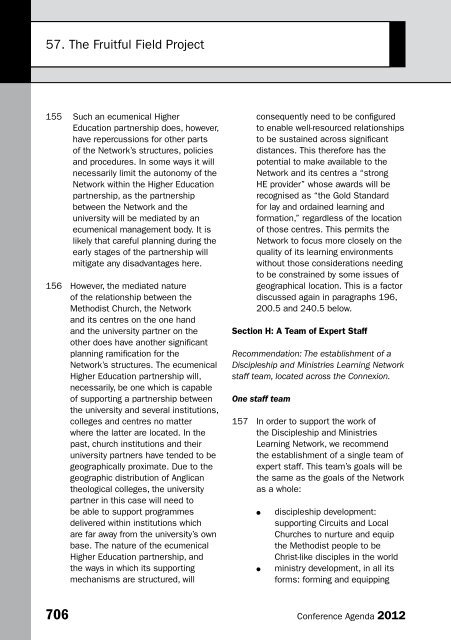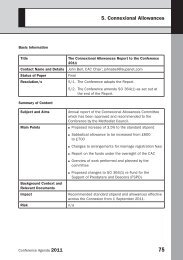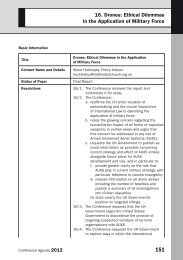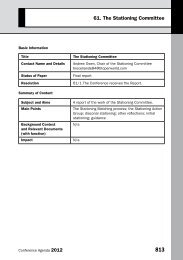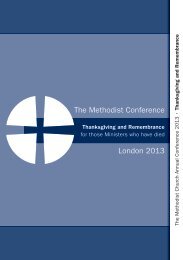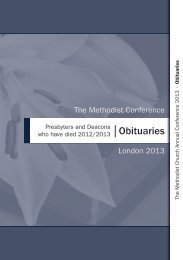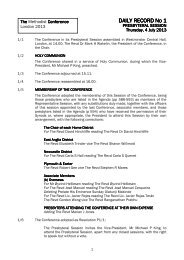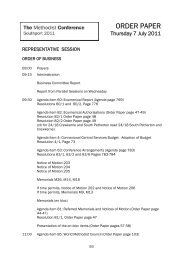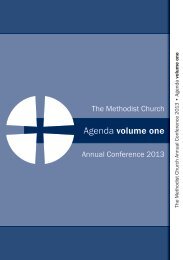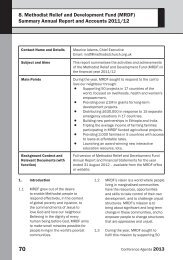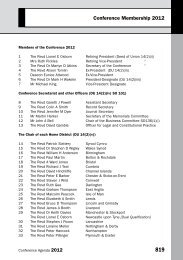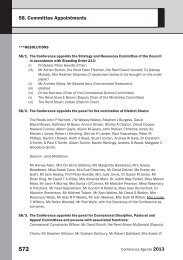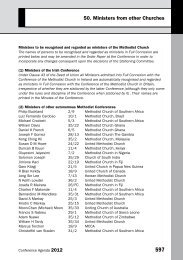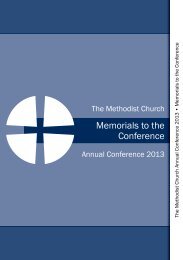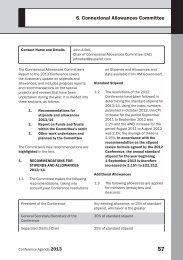Agenda Volume 3 - Methodist Conference
Agenda Volume 3 - Methodist Conference
Agenda Volume 3 - Methodist Conference
You also want an ePaper? Increase the reach of your titles
YUMPU automatically turns print PDFs into web optimized ePapers that Google loves.
57. The Fruitful Field Project<br />
155 Such an ecumenical Higher<br />
Education partnership does, however,<br />
have repercussions for other parts<br />
of the Network’s structures, policies<br />
and procedures. In some ways it will<br />
necessarily limit the autonomy of the<br />
Network within the Higher Education<br />
partnership, as the partnership<br />
between the Network and the<br />
university will be mediated by an<br />
ecumenical management body. It is<br />
likely that careful planning during the<br />
early stages of the partnership will<br />
mitigate any disadvantages here.<br />
156 However, the mediated nature<br />
of the relationship between the<br />
<strong>Methodist</strong> Church, the Network<br />
and its centres on the one hand<br />
and the university partner on the<br />
other does have another significant<br />
planning ramification for the<br />
Network’s structures. The ecumenical<br />
Higher Education partnership will,<br />
necessarily, be one which is capable<br />
of supporting a partnership between<br />
the university and several institutions,<br />
colleges and centres no matter<br />
where the latter are located. In the<br />
past, church institutions and their<br />
university partners have tended to be<br />
geographically proximate. Due to the<br />
geographic distribution of Anglican<br />
theological colleges, the university<br />
partner in this case will need to<br />
be able to support programmes<br />
delivered within institutions which<br />
are far away from the university’s own<br />
base. The nature of the ecumenical<br />
Higher Education partnership, and<br />
the ways in which its supporting<br />
mechanisms are structured, will<br />
consequently need to be configured<br />
to enable well-resourced relationships<br />
to be sustained across significant<br />
distances. This therefore has the<br />
potential to make available to the<br />
Network and its centres a “strong<br />
HE provider” whose awards will be<br />
recognised as “the Gold Standard<br />
for lay and ordained learning and<br />
formation,” regardless of the location<br />
of those centres. This permits the<br />
Network to focus more closely on the<br />
quality of its learning environments<br />
without those considerations needing<br />
to be constrained by some issues of<br />
geographical location. This is a factor<br />
discussed again in paragraphs 196,<br />
200.5 and 240.5 below.<br />
Section H: A Team of Expert Staff<br />
Recommendation: The establishment of a<br />
Discipleship and Ministries Learning Network<br />
staff team, located across the Connexion.<br />
One staff team<br />
157 In order to support the work of<br />
the Discipleship and Ministries<br />
Learning Network, we recommend<br />
the establishment of a single team of<br />
expert staff. This team’s goals will be<br />
the same as the goals of the Network<br />
as a whole:<br />
l<br />
l<br />
discipleship development:<br />
supporting Circuits and Local<br />
Churches to nurture and equip<br />
the <strong>Methodist</strong> people to be<br />
Christ-like disciples in the world<br />
ministry development, in all its<br />
forms: forming and equipping<br />
706 <strong>Conference</strong> <strong>Agenda</strong> 2012


